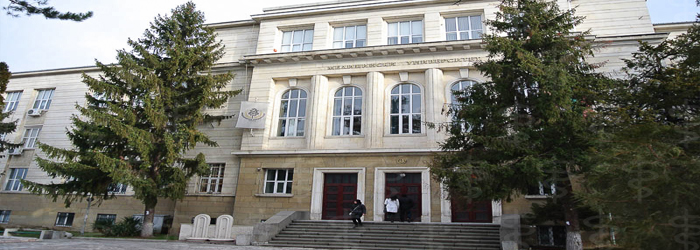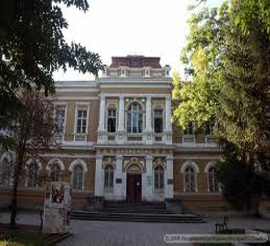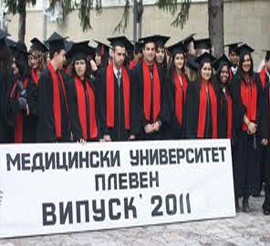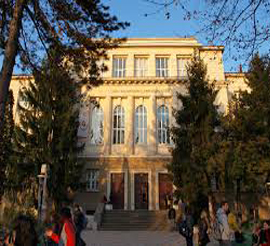
One of the five medical Universities in Bulgaria, was established in 1974, expanding the horizons, size and reputation of the City Hospital, founded in 1865. Today, combining traditions of the past with the present possibilities, it incorporates educational and therapeutic facilities, contemporary pre-clinical base, Institute Hospital with more than 1000 beds with clinics in all major medical fields, as well as a large number of specialized clinics and research units with modern diagnostic and therapeutic equipment. These are efficiently used to treat patients, train students, trainee doctors, post-graduates and for research work.
The University has all theoretic, pre-clinical and clinical departments required for the higher medical education. Up to date, more than 6000 from Bulgaria & foreign students from over 30 countries have graduated from the University. Out of 2044 students, 275 of them are foreign students, including 78 of Indian nationality – the biggest community of foreign students at the university. Other international students are coming from the following countries: Macedonia, Serbia, Ukraine, Moldova, Greece, Turkey, Nigeria, Albania, Cyprus, Congo, Syria, Algeria, USA, Japan, Great Britain and France. 835 young doctors from Bulgaria and abroad are taking postgraduate courses at the different specialized clinics of the University Hospital. The current number of PhD students is 53. Highly qualified lecturers with comprehensive academic experience are employed. The course of instruction is carried out in 24 departments by more than 60 professors and aound 300 assistant professors. Most of them are members of national and international scientific and medical societies and authors of research studies.
The academic year traditionally begins in the middle of September and ends in the end of May next year. It has two semesters of 16 weeks each, including 1-week holidays for Christmas and Easter. Because of the long terms necessary for processing of documents /especially visas/ of international candidates, the Academic Council of the University decided that the academic year for international students, English-language course of training, will start in the middle of February and end in the end of December. Since the year 2006-2007 the University started to organize a preparatory course in English language for international students coming from non-English-speaking countries, wishing to join the English language medical course. Various modern teaching methods are applied in the academic process. These include theoretical lectures, small group practical tutorials and seminars. Additionally, the students may join extracurricular teaching courses and scientific circles functioning at the departments. Training groups are composed of maximum 6 students.
Current monitoring and assessment of the students' knowledge in each subject is done by assistant professors, who are responsible for the students' group instruction during the semester. Examinations are conducted in all required subjects of instruction after each semester within the examination session, which lasts 45 days. Final assessment of knowledge acquired by the students after accomplishment of their full course of study is given by the State Examination Board at a comprehensive theoretical and practical examination.
The University has two students hostels with over 400 beds. The hostel rooms are double- and triple- bed rooms, centrally heated, each having a bathroom. Students are not required to live in hostels and may go into private accommodation if they wish. Meals are provided at the students' canteen at a discount. The sports facilities at the University enable the students to have regular physical training in different sport disciplines. There is an indoor multipurpose sports center, basketball and volleyball fields and tennis courts. The students can freely join students' unions and societies. Foreign students can establish their own national, ethnic and religious communities the functioning of which has to be in compliance with the laws of the Republic of Bulgaria. According to their interests and individual capabilities, students can become members of different scientific circles, culture and sports clubs. In accordance with the principles of non-discrimination the University does not have any different attitude to students in connection to their nationality, sex, age, religion, sexual orientation, ethnical and political affiliations, financial and health status.
Bulgaria; is a country in Southeast Europe. Bulgaria borders five other countries: Romania to the north (mostly along the Danube), Serbia and the Republic of Macedonia to the west, and Greece and Turkey to the south. The Black Sea defines the extent of the country to the east.
With a territory of 110,994 square kilometers (42,855 sq mi), Bulgaria ranks as the 16th-largest country in Europe. Several mountainous areas define the landscape, most notably the Stara Planina (Balkan) and Rodopi mountain ranges, as well as the Rila range, which includes the highest peak in the Balkan region, Musala. In contrast, the Danubian plain in the north and the Upper Thracian Plain in the south represent Bulgaria's lowest and most fertile regions. The 378-kilometer (235 mi) Black Sea coastline covers the entire eastern bound of the country. Bulgaria's capital city and largest settlement is Sofia. The emergence of a unified Bulgarian ethnicity and state dates back to the 7th century AD. In 1945, after World War II, it became a communist state and was a part of the Eastern Bloc until the political changes in Eastern Europe in 1989/1990, when the Communist Party allowed multi-party elections and Bulgaria undertook a transition to democracy and free-market capitalism with mixed results. Bulgaria functions as a parliamentary democracy within a unitary constitutional republic. A member of the European Union, NATO, the United Nations, the Council of Europe, the World Trade Organization and a founding state of the OSCE and the Black Sea Economic Cooperation Organization, it has a high Human Development Index of 0.743, ranking 58th in the world in 2010
Geography
Bulgaria lies between latitudes 41° and 45° N, and longitudes 22° and 29° E. Geographically and in terms of climate, Bulgaria features notable diversity, with the landscape ranging from the Alpine snow-capped peaks in Rila, Pirin and the Balkan Mountains to the mild and sunny Black Sea coast; from the typically continental Danubian Plain (ancient Moesia) in the north to the strong Mediterranean climatic influence in the valleys of Macedonia and in the lowlands in the southernmost parts of Thrace.
Economy
Bulgaria has an industrialized, open free-market economy, with a large, moderately advanced private sector and a number of strategic state-owned enterprises. The World Bank classifies it as an "upper-middle-income economy".Bulgaria has experienced rapid economic growth in recent years, even though its income level remains one of the lowest within the EU. According to Eurostat data, Bulgarian PPS GDP per capita stood at 44 per cent of the EU average in 2009.[96] The Bulgarian lev is the country's national currency. The lev is pegged to the euro at a rate of 1.95583 leva for 1 euro. In 2010, GDP (PPP) was estimated at $96.778 billion, with a per capita value of $12,851. The services sector accounts for 63.7% of the GDP, followed by the industry with 30.3% and agriculture with 6%. Major industries include iron, copper, bismuth and coal extraction, electronics, chemicals, machinery, steel and refined petroleum fuel production, vehicle components, firearms and construction materials. The total labor force amounts to 3.4 million people. Since a hyperinflation crisis in 1996/1997, inflation and unemployment rates have fallen to 7.2% and 6.3%, respectively, in 2008. Corruption in the public administration and a weak judiciary have also hampered Bulgaria's economic development.
Tourism
In 2008 Bulgaria was visited by a total of 8,900,000 people, with Greeks, Romanians and Germans accounting for more than 40% of all visitors. Significant numbers of British, Russian, Dutch, Serbian, Polish and Danish tourists also visit Bulgaria. In 2010, Lonely Planet ranked it among its top 10 travel destinations for 2011. Main destinations include the capital Sofia, coastal resorts Albena, Sozopol, Nesebar, Golden Sands and Sunny Beach and winter resorts such as Pamporovo, Chepelare, Borovetz and Bansko. The rural tourist destinations of Arbanasi and Bozhentsi offer well-preserved ethnographic traditions. Other popular attractions include the 10th-century Rila Monastery and the 19th-century Euxinograd château.
Health
Bulgaria has a universal, mostly state-funded healthcare system. The National Health Insurance Fund (NHIF) pays a gradually increasing portion of the costs of primary healthcare. Bulgaria has 181 doctors per 100,000 people, which is above the EU average. Some of Bulgaria's largest medical facilities are the Pirogov Hospital,Pleven Medical College Hospital and the Military Medical Academy of Sofia. Life expectancy is 73.4 years, which is below the European union average
Culture
Traditional Bulgarian culture contains mainly Thracian, Slavic and Bulgar heritage, along with Greek, Roman, Ottoman and Celtic influences. Thracian artifacts include numerous tombs and golden treasures. The country's territory includes parts of the Roman provinces of Moesia, Thrace and Macedonia, and many of the archaeological discoveries date back to Roman times, while ancient Bulgars have also left traces of their heritage in music and in early architecture.
Art, music and literature The country has a long-standing musical tradition, traceable back to the early Middle Ages.. The State Television Female Vocal Choir is the most famous performing folk ensemble, and received a Grammy Award in 1990.
Various modern teaching methods are applied in the academic process. These include theoretical lectures, small group practical tutorials and seminars. Additionally, the students may join extracurricular teaching courses and scientific circles functioning at the departments. Training groups are composed of maximum 6 students.
Current monitoring and assessment of the students' knowledge in each subject is done by assistant professors, who are responsible for the students' group instruction during the semester. Examinations are conducted in all required subjects of instruction after each semester within the examination session, which lasts 45 days. Final assessment of knowledge acquired by the students after accomplishment of their full course of study is given by the State Examination Board at a comprehensive theoretical and practical examination.
The town of Pleven
There are many reasons for choosing Pleven as a place where to study. There are many more for choosing the city as a place to live in and work during one’s undergraduate career.
Pleven is a modern city, the academic, economic, cultural and indeed medical center of Central and West-North Bulgaria, situated in the heart of the Danube plane, just two hours from the capital Sofia.
Pleven boasts cultural, leisure and sporting facilities of the highest order. Pleven at night is never dull. There is a vast array of things to do and places to go, with pubs and cafes to cater for tants also have their place. No religious problems have existed. The essential attitude of Bulgarians of any faith can be summarized in the motto: “Respect God and rely on yourself!” The official language spoken is Bulgarian. Foreign languages spoken include mostly English, German, French, and Russian.
Pleven is the birthplace of world-known Bulgarian opera singers as Katya Popova, Assen Selimski and Gena Dimitrova, and artists Iliya Beshkov and Svetlin Roussev. International festivals such as of opera singers and puppet theaters, take place in Pleven, as well as many national and local festivals, competitions and feasts. І. Admission procedures for citizens of countries – not members of the European Union: The University offers a preparatory course in English language for students who cannot meet this requirement. The duration of the course is one year.
The academic year for the first-year English-language-students, starts in February and finishes in December, comprising two semesters of 16 weeks each, including two one-week holidays for Christmas and Easter.
ІІ. Admission procedures for citizens of member-countries of the European Union: Citizens of countries which are members of the EU can apply and study at Medical University – Pleven following the same procedures and under the same conditions applicable for Bulgarian citizens.
Since its foundation in 1974 the Medical University of Pleven is a self-administrative public University specializing in Medicine and Healthcare, offering high quality education. It is generally regarded as one of the best institutions in Bulgaria in the domain of Medicine. It consists of three schools (Medicine, Public Health and Medical Care), one center for postgraduate training and the City Medical College, which was founded in 1948, offering more than nine Bachelor taught programs in English and Bulgarian, as well as many Postgraduate and Doctorate programs. The University also includes theoretical, preclinical and clinical departments. International students coming from non-English-speaking countries are offered a preparatory course in English in order to ease their transition for the demands of their studies. The Academic Hospital alone boasts more than 1,000 beds as well as a vast number of specialized clinics and research units, enhanced with the finest equipment and state of the art research facilities, including the Endoscopic Training Centre for Robotic Surgery, which was inaugurated by the Bulgarian President in 2007. The University employs more than 60 highly trained professors and 300 adjunct and assistant professors, the vast majority of whom are members of the most renowned scientific and medical communities of the world. Teaching methods include lectures, small group practical tutorials and seminars, besides workshops. The Institution’s library, established in 1974, is one of the greatest in Bulgaria, having amassed more than 74,000 volumes of medical bibliography in Bulgarian and English and still growing, and provides access for its students to all main online sources pertaining to medical studies, with the collection being crowned with its rich multimedia sources of audio-visual digital catalogues of medical films and recordings. Finally, the University has its own soccer, basketball and volleyball courts, as well as its hostels, for those students seeking accommodation within the campus.
Medicine is an entirely English-taught programme, lasting 6 years. Courses typically span 10 semesters of academic training. The usual academic track in Bulgaria is structured so that the first 2 years focus on pre-clinical study and theory, the next 3 years for the most part focus on clinical study and, finally, the programme is brought to completion with an internship year of medical rotations (310 days) before graduation. With regard to the curriculum and laboratory work, as well as research assignments, it is important to note that national standards are aligned to European Union requirements. Moreover, during the internship year, students are required to take state exams for licensing. There are also summer practical internships that are obligatory for students in their 2nd, 3rd and 4th year of studies. Having fulfilled the requirements of the academic programme, as well as the year-long internship and having passed the state exams, students receive the professional qualification of Physician or Doctor of Medicine (MD), and are awarded a Master's Degree with full privileges worldwide. The Degree and license are recognized in all EU member states and abroad. In turn, many graduates opt to continue in Bulgaria with their specialization, while some return to their home country or go to another country to seek residence for their practice. At present, graduates of Bulgarian universities who practice medicine internationally number in the thousands.
There is no entrance examination and applicants have to submit the below documents:
Pleven is the seventh biggest city in Bulgaria with an estimated population of 106,000 people. It is located in the northern part of the country, 170 km from Sofia, the capital of Bulgaria, in a rural territory surrounded by low hills, known as the Pleven Heights. The smaller river Tuchenitsa runs through the city, which is fringed by the powerful flow of the river Vit in the pastures.
The oldest archaeological findings date from the 5th century BC, when the region was populated by the Thracians, a Greek speaking tribe. In the Middle Ages, the region was inhabited by the Slavs. It was at this time (13th century) that Pleven received its present name. While still under Ottoman rule, the citadel of Pleven played a most significant role during the Rosso-Turkish wars (1877-78) particularly during the siege of the city by the Russians and the Romanians, which led to its capture by the former, circa 1877. The events that transpired at Pleven were decisive for the liberation of Bulgaria and Romania from the Ottoman Empire. Nonetheless, it is this very strategic location of the area which has yet again led to its blossom and the modern fast-paced economic development the city enjoys to date.
Pleven’s key role during the aforementioned wars is reflected in some 200 monuments, such as the Mausoleum of St. George, erected in memory of the Russians and the Romanians who gave their lives during the siege, the ossuary in Skobelev park and the Pleven Panorama, a modern building created after the Borodino Panorama in Russia, and related, once again, to the famous siege of the city. In addition, there are a lot of museums, one of which is the Pleven Regional Historical Museum. The city is also peppered with theatres, the most notable being the Ivan Radoev Dramatic Theatre. Finally, it is worth mentioning that Pleven is often regarded as a sports center in Bulgaria, mostly centering on soccer.
The Republic of Bulgaria is located in the Southeast of Europe and has a population in the vicinity of 7,500,000. At the precipice of the Balkan Peninsula, fringed by Greece to the south and Turkey to the east, and with Romania to the north, Serbia and FYROM to the west, it has been rendered an economic hub, it being the case it shores the Black sea. Small though it may seem, particularly due to its geopolitical locus as it is not landlocked, it has been rendered a strong industrial and agricultural market economy. Its capital, Sofia enjoys a thriving economy with a population nearing 1,500,000 people. The official language of the country is Bulgarian, whereas the official religion is Eastern Orthodox Christianity. The population consists mainly of Bulgarians (85%). Additionally, there is a Turkish minority (8%), as well as a Roma minority (5%).
Bulgaria has a long history spanning nearly 2,400 years evinced upon innumerable monuments, statues, churches and chantries. Many a Bulgarian city, Sofia and Plovdiv in particular, are renowned for their cultural and historical significance. After the fall of the communist regime, efforts to modernize the country’s economy and educational system have paid off, evident in the blossoming architecture and booming economic activity. This has led to the significant development of the Bulgarian Universities, some of which are counted within the best of Eastern Europe. Better yet, life in Bulgaria is particularly cheap by comparison to other EU member states, making it an extremely popular destination for students from all over the world.
Degree – Master’s
Professional qualification – Physician
Duration of the course – 6 years,
5692 academic hours and 361 credits
Medical University – Pleven offers a full-time six-year course of training in the specialty of Medicine which is structured in the following way:
2 years of pre-clinical study, 3 years of clinical study, and one year of state clinical practice /internship/. For more information see Academic Curriculum.
All graduates are awarded a Master’s Degree diploma of completed higher medical education. The academic Master’s Degree is conferred to them along with the professional qualification Physician.
The studies are carried out in two courses according to the medium of instruction – in English and in Bulgarian language. The English-language-course students have to attend compulsory classes in Bulgarian language /6 hours a week/ for the first three years of training in order to be able to communicate with patients in the University hospital throughout their clinical studies.
Foreign citizens, coming from countries, that are not members of the EU, are only enrolled for training as self-paid students. They should apply at the Educational Department or send their documents to the University by post. The following documents are required:
An Application form with an attached brief CV of the candidate
A secondary-school-leaving certificate with a statement of marks including the subjects of Biology and Chemistry. The average mark in Biology and Chemistry should be equal or higher than 70% of the possible maximum in the country. The certificate should be translated into Bulgarian language and legalized at the Bulgarian Embassy in the respective country. If difficulties with the translation occur, the certificate can be legalized and presented in English language. In these cases, the University will collect a fee for authorized translation.
A medical certificate issued not earlier than one month prior to the application date, stating that the applicant does not suffer from any communicable diseases, being in good physical and mental health to pursue a training course in Medicine. This certificate should be translated and legalized in the above way.
A certificate stating that the applicant has the right /is eligible/ to continue his/her education into a higher educational institution in his/her own country, translated and legalized in the above mentioned way.
TOEFL 5.5 /or IELTS 6.0 /or Cambridge First Certificate is required as an evidence of English proficiency for candidates coming from countries where English is not the official language. This document should be translated and legalized in the above way.
Six recently-taken color photos /passport size/.
Copy of the international passport of the candidate.
Application starts in June and finishes on the 1st of October every year. The application documents must be sending to the postal address of the University.
The application for the February 2015 intake starts on the 3rd of June 2014 and finishes on the 1st of October 2014
How to apply
ІІІ. Admission procedures for citizens of dual citizenship: Applicants with dual citizenship /one of which is Bulgarian/ should submit their applications before the beginning of the academic year, presenting the identical documents listed in part I. Admission procedures for citizens of countries – not members of the European Union plus copies of passport of each citizenship.
IV. Transfer of students. Recognition of completed periods of study and credits transfer in the specialty of Medicine of foreign residence at MU-Pleven
Medical University – Pleven organizes the procedure for recognition of periods of study completed in foreign higher schools in accordance with the Higher Education Act , the ORDINANCE on the State Requirements for Recognition of University Education Acquired in Foreign Institutions of Higher Learning, and of Periods of Studies, Completed at Such Establishments (Adopted by Council of Ministers Decree No. 168 of 14.08.2000), the Regulation on Structure and Activities of MU-Pleven and the Educational Process Organization Rules at MU-Pleven.
1. Recognizing of completed periods of study in foreign higher schools and credits transfer is possible only in the cases when they were acquired from training in the specialty Medicine for educational-qualification Master’s degree;
2. The foreign nationals studying abroad at their own financial resources might continue their training at MU-Pleven after they have completed successfully at least one semester in the respective university.
3. The procedure on recognizing of completed periods of study and credits transfer should have been completed before the applicant is enrolled for a student at MU-Pleven;
4. Persons who are eligible and want such recognition should submit a personal written statement (form) as the following documents are enclosed to it:
а) Identity document;
b) Original or notarized copy of a transcript of records for completed period of study or another identical document, issued by the Institution of higher learning including the following information: names of the studied disciplines in accordance with the curriculum with total number of hours (theoretical and practical classes), description of the grading system and passed examinations;*
c) Curriculum and syllabus including detailed description of the topics covered by the disciplines;
d) Proof for paid fee for the recognition procedure in the amount of 200 BGN.
*The documents listed in point 4 b) must be legalized, translated into Bulgarian language and certified in accordance with international treaties of Republic of Bulgaria and the country in which they are issued in line with the general procedure for legalization, translation and certification of documents and other papers.
5. The applications are submitted from 01 June to 01 September each year at Admission department.
6. The documents are considered by the Expert Committee, appointed by Order of the Rector. Committee members are professors from different departments and at least one representative of the Educational department and Student Office at the Faculty of Medicine. The Chairman of the Committee is the Vice Rector for Education;
7. The Expert Committee verifies at the National Information and Documentation Center the status of the foreign higher schools/universities and the authenticity of the documents issued by them under Art. 17, par. 3, Item 1-3 of the Ordinance on the State Requirements for Recognition of University Education Acquired in Foreign Institutions of Higher Learning, and/or of Periods of Studies Completed at Such Establishments;
8. The Expert Committee issues a statement, pointing out:
a) Compliance/non a compliance of the data of the documents for the studies in a foreign higher school with state requirements for acquiring higher education in Republic of Bulgaria and Educational Process Organization Rules at MU-Pleven;
b) The specific reasons for the recognition or non-recognition.
In case of refusal the experts may enter in their statement a recommendation on possible measures that person could undertake to get recognition at a later stage, including passing additional examinations.
c) Foreign nationals can not be transferred later than 5th semester and the final decision exactly in which semester the applicant should be registered is taken by the Academic Council on the recommendation of the Expert Committee.
Study Medicine in English at Pleven Medical University (Medical School)
No entrance examination
Tuition fees £5,800 / €7,000 per annum
Entry in February
Fully recognized Degree globally, and internationally accredited institutions
Financial aid (Student Loans) from the Bulgarian Government
Low cost of living, approximately £4,000 / €5,000 a year
University
Study Programme
Admission
2. A secondary-school-leaving certificate with a statement of marks. The certificate should be translated into Bulgarian language and legalized at the Bulgarian Embassy in the respective country.
3. A medical certificate issued not earlier than one month prior to the application date, stating that the applicant does not suffer from any communicable diseases, being in good physical and mental health to pursue a training course in Medicine. This certificate should be translated and legalized in the above way.
4. A certificate stating that the applicant has the right /is eligible/ to continue his/her education into a higher educational institution in his/her own country, translated and legalized in the above mentioned way
5. Four recently-taken color photos /passport size
6. Copy of the international passport of the candidate
City
Country





